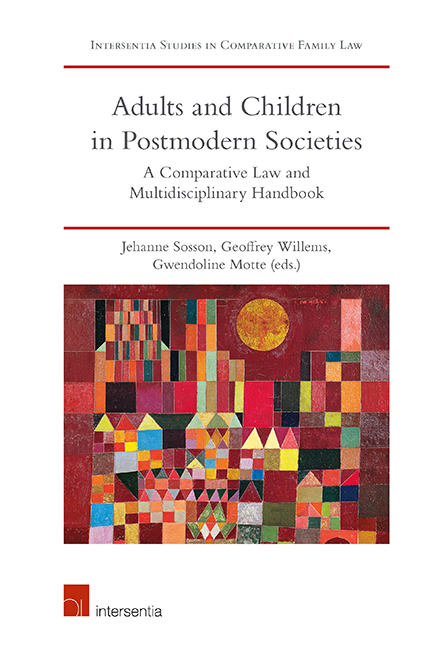Book contents
- Frontmatter
- Contents
- List of Cases
- List of Contributors
- Introduction
- PART I NATIONAL REPORTS ON LEGAL REGULATIONS OF RELATIONSHIPS BETWEEN ADULTS AND CHILDREN
- PART II INTERDISCIPLINARY APPROACH
- PART III INTERNATIONAL LAW INSIGHTS
- PART IV COMPARATIVE APPROACH
- General Conclusion: The Challenge of Transparent and Inclusive Parenthood/Parentality in a Pluralist and Cosmopolitan Context
- About the Editors
General Conclusion: The Challenge of Transparent and Inclusive Parenthood/Parentality in a Pluralist and Cosmopolitan Context
Published online by Cambridge University Press: 26 June 2019
- Frontmatter
- Contents
- List of Cases
- List of Contributors
- Introduction
- PART I NATIONAL REPORTS ON LEGAL REGULATIONS OF RELATIONSHIPS BETWEEN ADULTS AND CHILDREN
- PART II INTERDISCIPLINARY APPROACH
- PART III INTERNATIONAL LAW INSIGHTS
- PART IV COMPARATIVE APPROACH
- General Conclusion: The Challenge of Transparent and Inclusive Parenthood/Parentality in a Pluralist and Cosmopolitan Context
- About the Editors
Summary
The Adults and Children project arose from the very common observation that changes in human behaviour and scientific techniques lead to complexified family configurations involving a wide range of potentially significant adults. Besides parents, biological fathers, gametes donors and step-parents are only a few examples of additional adults involved in the conception and/or education of a child. For family lawyers, the question then arises of whether and how the relationship between the child and these various adults could or should be recognised and protected by law.
The 18 national reports included in Part I of this book illustrate the great diversity of national approaches of adult – child relationships while at the same time demonstrating that the basic issues are similar in nature and can be expressed in fairly similar terms. Beyond the specificity of legal solutions elaborated in each national context, the range of possible legal paths is not infinite and some common patterns arise. The national reports were elaborated on the basis of a questionnaire and they are presented in this book under this question/answer format which makes the comparison easier. Whereas the first three sections of the questionnaires contemplate three different types of families (traditional families, families created through assisted reproductive technologies (ART) and families based on social and emotional links), the following two sections were dedicated to the relevance of the marriagebased, heteronormative and binary parental model and to the respective role of statutory regulation, judicial discretion and parties’ autonomy in the legal regulation of adult – child relationships. Finally, in the sixth section, the national experts were invited to comment on our proposed conceptual model of the legal regulation of adult – child relationships in postmodern societies. We are most grateful that all the experts consented to engage in this delicate exercise and, in the comparative law contributions discussed below, our team at the Family Law Centre of the Université catholique de Louvain (UCLouvain) tried to make the best use from the very useful information and the very inspiring reflections provided by the reports. Before engaging in the comparative analysis, however, the editors wanted to include some interdisciplinary and international contextualisation which is afforded by Parts II and III of this book.
- Type
- Chapter
- Information
- Adults and Children in Postmodern SocietiesA Comparative Law and Multidisciplinary Handbook, pp. 865 - 874Publisher: IntersentiaPrint publication year: 2019



